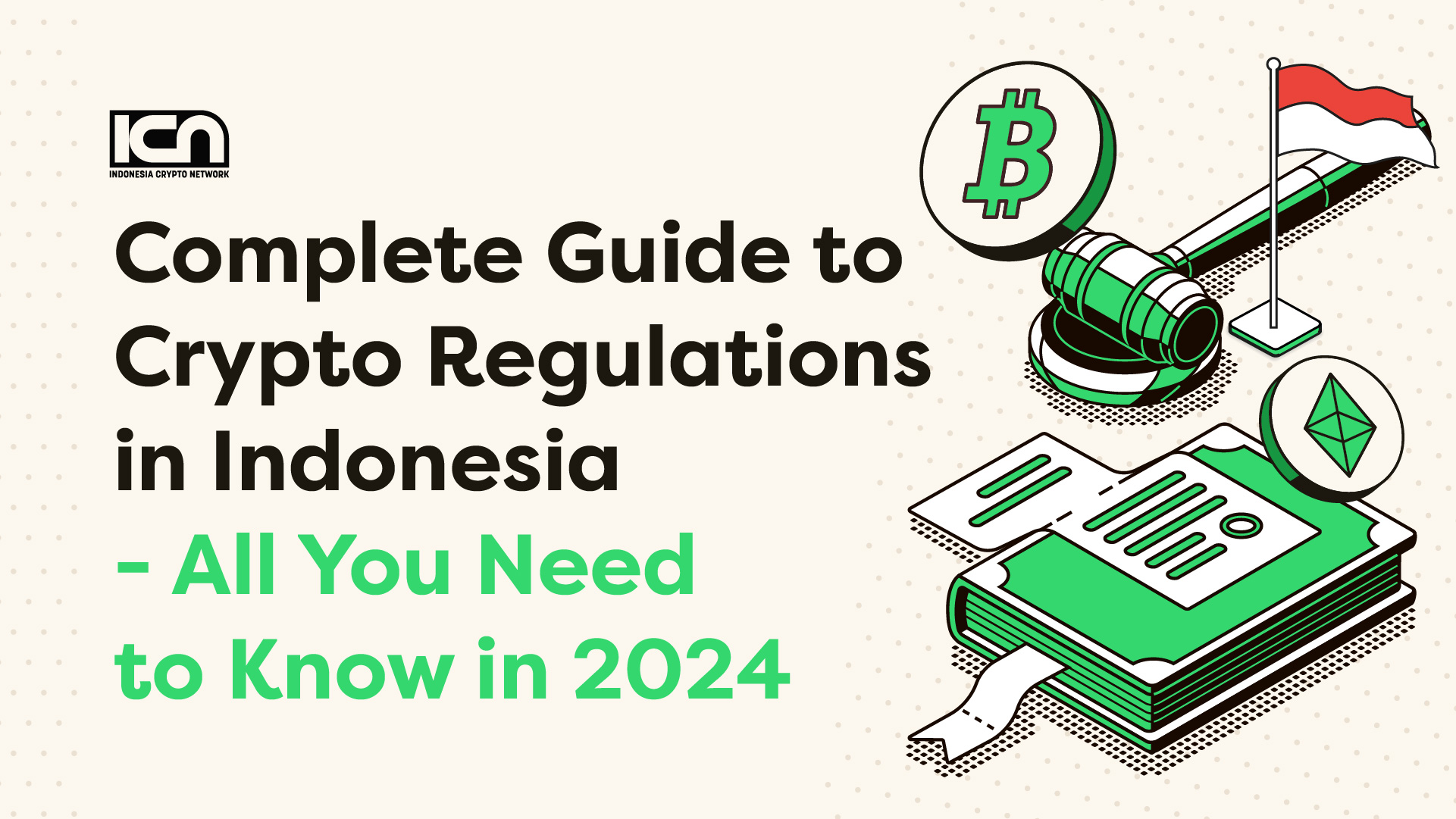Indonesia is one of the countries that experienced the highest growth in crypto and blockchain development in 2022. The fourth biggest country recorded a significant surplus in the number of crypto traders that surpassed the number of stock traders back in the 2021 Bull Run. The country’s consistent digitalization brings itself to the interests of crypto companies looking to expand their user base in the region. Navigating the country with the constantly changing regulations is not an easy job. In this article, you can find the complete crypto regulations update in Indonesia.
Main Regulator and Base Regulation
Since the asset started to draw attention in the country, the crypto asset is classified as a commodity in Indonesia and legal to be traded as one. Hence until December 2023, the regulation of crypto asset trading activities is governed under the Ministry of Trade, and supervised under the Commodity Futures Trading Regulatory Agency (CoFTRA), locally known as Bappebti. The Ministry issued Regulation No.99/2018 to regulate crypto asset trading activities for the first time in 2018.
From 2018 til 2023, the government has issued these regulations to develop the legal framework of crypto assets in Indonesia:
- SK Bappebti No.5/2019 – governed the technical provisions for implementing the market for crypto on futures exchanges
- The above regulation was then modified into the SK Bappebti No.9/2019
- SK Bappebti No.7/2020 – Determination of the List of Crypto Assets That Can Be Traded on the Market (there are 229 assets listed)
- SK Bappebti No.11/2022 – Addition of the List of Crypto Assets That Can Be Traded on the Market (there are 338 assets listed)
- SK Bappebti No.4/2023 – another edition of the List of Crypto Assets That Can Be Traded on the Market (there are 501 assets listed)
- SK Bappebti No.8/2021 – Guidelines for Organizing Physical Market Trading in Crypto Assets on the Futures Exchange → to then modified in SK Bappebti No.13/2022
Recently, the government also passed RUU P2SK – Bills for Development and Strengthening of the Financial Sector) – which will shift the regulatory body for crypto assets from Bappebti to OJK in 2 years. Otoritas Jasa Keuangan (Financial Services Authority) will handle the crypto regulations from 2025 forward.
Licensing Requirements
Approval from BAPPEBTI is necessary for engaging in cryptocurrency-related activities within Indonesia, ensuring legal compliance. Specific requirements apply to each activity type, such as crypto bourse, crypto futures clearing house, crypto-asset depository, and crypto-asset physical trader (exchange). Here are the license requirements for all the entities:
- Crypto-Asset Physical Trader (Crypto Exchange)
- Crypto exchange should have a paid-up capital of IDR 100,000,000,000 (around 6.3mio USD)
- The amount of equity that must be maintained is at least IDR 50,000,000,000.00, (around 3mio USD)
- Report submission: submit periodic reports, business plan reports, and business plan achievement reports to the CoFTRA.
- Board of Directors: The prospective crypto exchange must have at least 3 (three) members of the board of directors, of which 2/3 (two-thirds) of them must be Indonesian citizens and domiciled in Indonesia. Additionally, the president’s director must be an Indonesian citizen.
- Board of Commissioners: The prospective crypto exchange must have at least 2 (two) members of the board of commissioners, of which 2/3 (two-thirds) of them must be Indonesian citizens and domiciled in Indonesia.
- Crypto Bourse
- At the time of initial submission of the application has paid up capital of at least IDR 500,000,000,000.00 (around 30mio USD) no later than 2 months since obtaining a business license as a Crypto Bourse that specifically facilitates trading Crypto Assets
- maintain equity of at least 80% of the paid-up capital
- Crypto Futures Clearing House
- have the least paid-in capital IDR 250,000,000,000.00 (around 16mio USD)
- maintain equity of at least 80% of the paid-up capital
- Crypto Depository
- have the least paid-in capital IDR 250,000,000,000.00 (around 16mio USD)
- maintain equity of at least 80% of the paid-up capital
Further details of the technical requirements can be found on SK Bappebti No.8/2021.
Crypto Tax in Indonesia
In May 2022, the Indonesian Ministry of Finance officially started to impose tax on crypto assets transactions through the enactment of PMK 68/PMK.03/2022.
There are two types of taxes for crypto transactions in Indonesia: Income Tax (PPh) and Value Added Tax (VAT).
- 0.11% – 0.22% VAT rate on crypto asset trading
The VAT rate on crypto asset trading is 0.11% of the transaction value if the trading organizer is a registered exchange and 0.22% for a non-registered exchange.
- 0.1% – 0.2% Final Article 22 Income Tax rate on crypto asset trading income
PPh rate for trading crypto assets is 0.1% of the value of the crypto asset if the transactions happen on a registered exchange, and 0.2% for a non-registered exchange
- 1.1% VAT rate on mining services
The VAT rate for mining services is 1.1% of the crypto asset conversion value and mining services already have asset transaction verification.
- 0.1% Final Income Tax rate on crypto asset mining income
Final Income Tax rate on crypto asset mining income is 0.1% of the income received or earned by crypto asset miners, excluding VAT.
Establishment of the National Crypto Exchange (Crypto Bourse)
Indonesia’s crypto market has witnessed significant growth and transformation in recent years, marked by a significant increase in crypto users, business players, and pivotal regulatory developments. As of December 2023, it is noted that there are 17,7 million crypto asset holders and 32 registered crypto exchanges – some of the biggest players are Indodax, Tokocrypto, Reku, Pintu, and Upbit Indonesia.
One of the key developments that paved the way for this transformation is the establishment of a national crypto exchange, clearing house, and crypto asset depository. PT. Bursa Komoditi Nusantara, the national crypto exchange, serves as a pricing reference index, similar to the Nasdaq composite for traditional stocks. This distinction is crucial as it highlights the exchange’s unique purpose within the crypto ecosystem. PT Kliring Berjangka Indonesia, the clearing house, is crucial in facilitating secure and transparent transactions within the crypto market. Simultaneously, PT Tennet Depository Indonesia, the depository, ensures the safekeeping of digital assets, addressing concerns related to security and custody.
This strategic move by the Indonesian government is expected to bring about increased investor confidence, attracting more participants to the crypto market. The establishment of these key entities not only bolsters the infrastructure supporting crypto trading but also positions Indonesia as a progressive player in the global cryptocurrency landscape.
Regulatory Transition: Bappebti to OJK
As of now, Indonesia’s crypto regulations are in a state of transition, guided by a new law that transfers supervisory authority from CoFTRA (Commodity Futures Trading Regulatory Agency) locally known as Bappebti to OJK (Otoritas Jasa Keuangan), the Indonesia financial services authority. This transition is set to unfold over two years, during which Bappebti will gradually cede its regulatory responsibilities to OJK. The shift is significant as it reshapes the regulatory framework for crypto assets in the country.
Presently, cryptocurrencies in Indonesia are treated as commodities rather than legal tender. Traders engage in crypto transactions under the supervision of Bappebti, adhering to commodity futures trading regulations. However, with the ongoing transition, there is anticipation that cryptocurrencies will be reclassified as securities under the new regulatory authority.
OJK’s Regulatory Approach: Bridging Traditional and Digital Securities
The role of OJK in overseeing the crypto market signifies a broader regulatory approach, encompassing both traditional financial securities and emerging digital assets. This consolidation of regulatory oversight is expected to streamline market participant compliance requirements while ensuring the financial sector’s integrity and stability.
The Indonesian government’s forward-looking stance on crypto regulations reflects a commitment to balancing innovation with investor protection. By expanding the list of tradable cryptocurrencies, establishing critical infrastructure, and transitioning regulatory authority, Indonesia is poised to become a key player in the global crypto market.
In conclusion, as of 2024, Indonesia’s crypto regulations are evolving, with the establishment of a national crypto exchange and a gradual transition of supervisory authority to OJK. The expansion of tradable cryptocurrencies and the impending reclassification of crypto assets as securities indicate a progressive approach that seeks to harness the benefits of digital currencies while ensuring a robust regulatory framework for the Indonesian crypto market.
Indonesia is the 40th Member of the Financial Action Task Force (FATF)
In October 2023, Indonesia officially joined as the 40th member of FATF. Through this membership, Indonesia must comply with the Travel Rules provided by the FATF. The Travel Rule is a global regulation requiring all financial institutions to provide additional information when sending and receiving assets between institutions. In 2019, this rule will also be applied to digital asset transactions.
Indonesia itself has implemented the Travel Rule since 2021. Through this rule, transactions with a minimum nominal value of US$1,000 must involve sender and recipient information consisting of name, wallet address, identity card, and so on.
This regulation means that crypto transactions on exchanges registered with Bappebti with this nominal value must comply with the rules and cannot directly process transactions like transactions with a nominal value below US$1,000.
Apart from the Travel Rule, FATF member countries must also have regulations related to DeFi and anti-money laundering systems that ensure transactions are not carried out for illegal activities. Countries must also monitor transactions in P2P, DeFi, private wallets, etc.
Central Bank Digital Currency (CBDC) – Digital Rupiah
In November 2022, the Central Bank of Indonesia released the Central Bank Digital Currency (CBDC) whitepaper, the project is named “Proyek Garuda”.
BI Governor, Perry Warjiyo, said that the development of the Digital Rupiah was a sign of Indonesia’s readiness to catch up with countries that had already implemented digital currencies.
The digital Rupiah will have the same role as the Rupiah that is already in circulation, the only difference is the form. The issuance of digital Rupiah is also a form of reducing the risks of digital currency issued by the private sector.
Up until now, there has been no significant development in CBDC.

